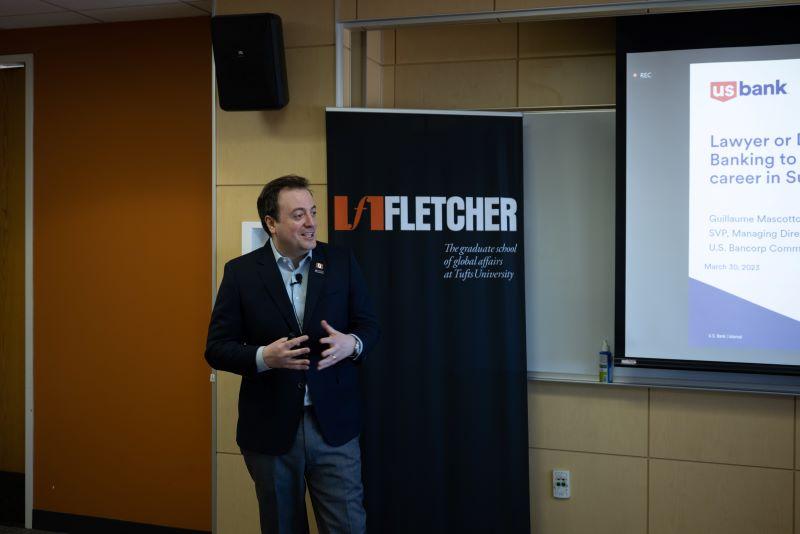-

Hear from Professor Monica Toft
Learn how Professor Monica Toft is shaping the study of global affairs and diplomacy at Fletcher.
Hear from Prof. Toft -

Explore Fletcher academics in action
Fletcher Features offers insights, innovation, stories and expertise by scholars.
Get global insights -
Get application tips right from the source
Learn tips, tricks, and behind-the-scenes insights on applying to Fletcher from our admissions counselors.
Hear from Admissions -

Research that the world is talking about
Stay up to date on the latest research, innovation, and thought leadership from our newsroom.
Stay informed -
Meet Fletcherites and their stories
Get to know our vibrant community through news stories highlighting faculty, students, and alumni.
Meet Fletcherites -

Forge your future after Fletcher
Watch to see how Fletcher prepares global thinkers for success across industries.
See the impact -

Global insights and expertise, on demand.
Need a global affairs expert for a timely and insightful take? Fletcher faculty are available for media inquiries.
Get in Touch
Ingenuity and Entrepreneurship for Sustainable Finance
A conversation with MALD alumnus Guillaume Mascotto

When Guillaume Mascotto F12 needed to develop a new market entry strategy for a client in his Fletcher global consulting course, he didn’t turn to the internet but went straight to the source—in Kazakhstan.
Enrolled in Professor Rusty Tunnard’s course, Mascotto and a fellow classmate saw an opportunity to collect invaluable insight for their client and booked economy class tickets to Almaty for their spring break.
“We needed to be on the ground to understand the realities and the balance of risk,” said Mascotto. “We used the Fletcher network to connect with the American presence there, and they plugged us with the different stakeholders. We got a lot of information. The whole trip was planned a couple of days in the Fletcher student ‘Green House’ after we got the mandate from the client.”
Returning to campus, he and his colleague were able to provide a recommendation with nuance and “on-the-ground” variables they would not have appreciated had it not been for their trip. Throughout his career, Mascotto has seen that creativity and face-to-face connection provide essential insight for a complex global world, whether at Fletcher or at U.S. Bank, where he is now senior vice president and managing director of sustainable finance.
Originally from Montreal, Canada, Mascotto completed a bachelor’s and master’s in political science with a focus on foreign policy analysis and global politics. His career led him to Fletcher while he was enrolled in a Finnish-Russian Cross-Border University graduate program, studying Russia’s energy security complex. Realizing he needed a stronger technical background in energy and finance, he applied to graduate schools and matriculated to Fletcher, where he appreciated the school’s collaborative atmosphere and multi-disciplinary curriculum.
In this same spirit of connection, Mascotto visited campus last week as part of the Institute for Business in the Global Context’s global speaker series, IBGC Speaks, during which he offered insight into the role banks play in the deployment of capital toward sustainable finance goals. At U.S. Bank, Mascotto is defining the bank’s sustainable finance goals, and he has a clear message. “As customers focus more on transitioning toward a lower-carbon economy and elevating communities through inclusive access and growth, we’re evolving our products and services to meet their financial needs," he said.
“Banks are going to be a big catalyst of social and environmental net positives,” he added. “I found this opportunity at U.S. Bank and said, ‘I’m going to use all my experience—from sustainability in the corporate world to working for an Environmental, Social and Governance (ESG) ratings agency to building investment-led sustainable investing platforms for global asset management firms—and apply that to banking.”
To do this, he has worked hard to avoid siloed thinking. Looking across the field, he has seen other companies put a heavy thumb on the scale of their environmental goals, in turn exacerbating risk exposure to human rights issues along the supply chain, or dialing back on corporate governance. In honing the bank’s strategy, Mascotto sees a web connecting access to capital, net zero goals, environmental finance, and their community-based plan, all essential to creating work that is sustainable in what he understands as the truest sense of the word: the balance of social, environmental, and economic objectives.
“My job is to help business lines identify new commercial opportunities flowing from sustainability mega-trends. I do that by setting up a rigid yet dynamic sustainable finance framework,” he said. “We use it to inform our business cases. These allow us to look at social and environmental issues and transpose them into financial terms. In turn, these also turn into actual products that can not only address the issues but fit well with the banking product suite we have and be profitable.”
Devising his plan, Mascotto also wanted to incentivize both clean energy industry leaders and other players poised for the global energy transition. While not every firm or organization will be the leader in capitalizing on climate solutions, he sees an important opportunity to activate customers through their green transition. Employing a multipronged approach, he hopes to address issues of concern to sustainable finance practitioners across sectors.
Addressing a room of students interested in careers in sustainable finance, he also offered important advice, from speaking the language of finance to seizing opportunities as they arise, just as he did with his classmate.
“I think the lesson is if you have to do something, do it. If you have to dig deeper into highly complex issues not many understand or fly somewhere to unearth details not accessible through traditional primary research, even if it’s long and tiring, when you get back, you’ll be the team differentiated because you thought creatively and dared to go there…you’ll be the team that did it the Fletcher Way.”
Read more about Fletcher's MALD degree program.

